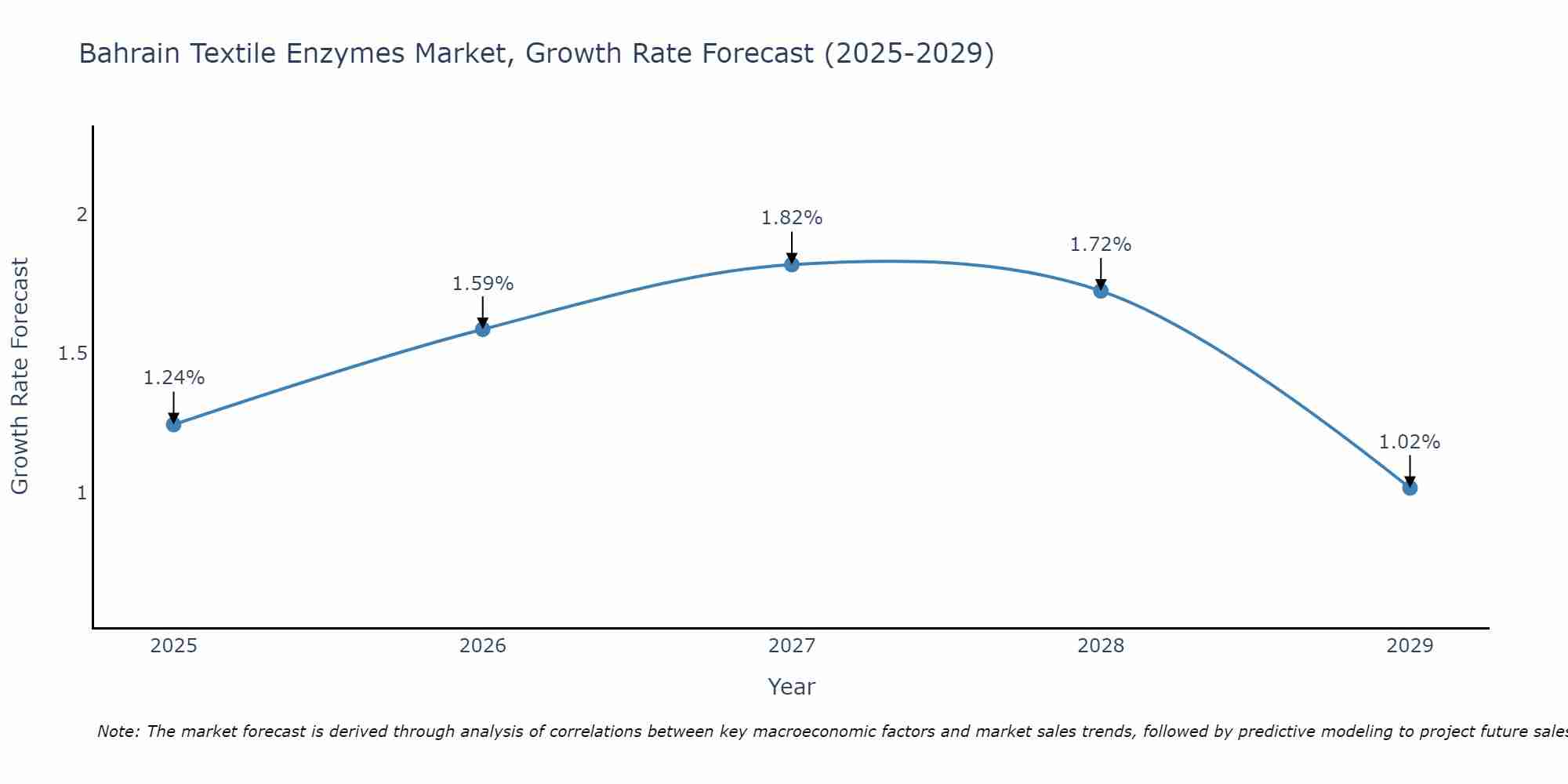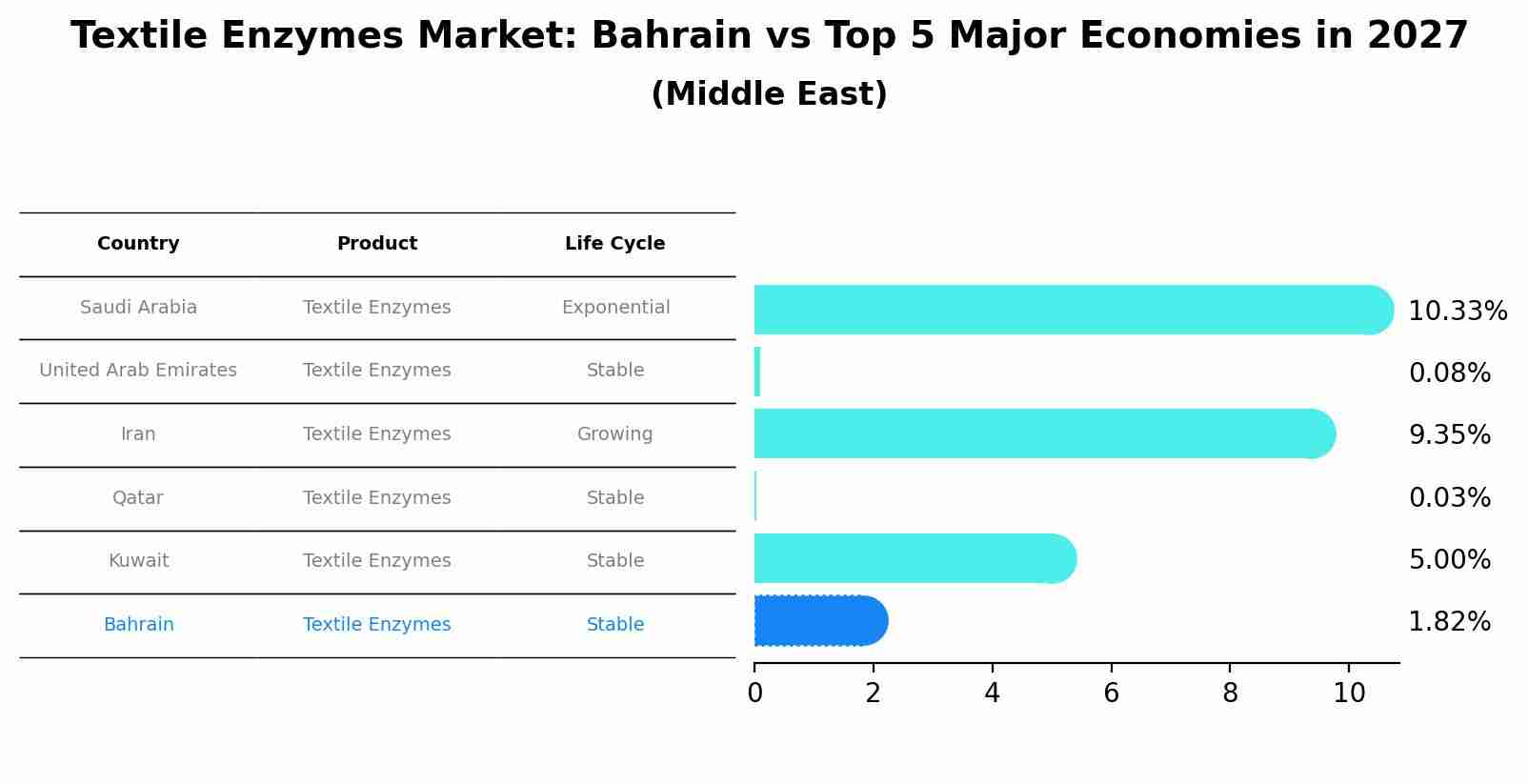Bahrain Textile Enzymes Market (2025-2031) Outlook | Growth, Analysis, Revenue, Size, Share, Value, Trends, Companies, Industry & Forecast
| Product Code: ETC094083 | Publication Date: Jun 2021 | Updated Date: Apr 2025 | Product Type: Report | |
| Publisher: 6Wresearch | Author: Ravi Bhandari | No. of Pages: 70 | No. of Figures: 35 | No. of Tables: 5 |
Bahrain Textile Enzymes Market Size Growth Rate
The Bahrain Textile Enzymes Market is projected to witness mixed growth rate patterns during 2025 to 2029. Growth accelerates to 1.82% in 2027, following an initial rate of 1.24%, before easing to 1.02% at the end of the period.

Textile Enzymes Market: Bahrain vs Top 5 Major Economies in 2027 (Middle East)
By 2027, the Textile Enzymes market in Bahrain is anticipated to reach a growth rate of 1.82%, as part of an increasingly competitive Middle East region, where Saudi Arabia remains at the forefront, supported by United Arab Emirates, Iran, Qatar and Kuwait, driving innovations and market adoption across sectors.

Bahrain Textile Enzymes Market Overview
The textile enzymes market in Bahrain is seeing robust growth due to the increased demand for eco-friendly and sustainable textile processing solutions. Enzymes are used in various stages of textile production, such as desizing, scouring, and bio-polishing, which helps reduce water and chemical consumption. As environmental regulations become stricter, the use of textile enzymes is becoming a preferred choice for manufacturers in Bahrains textile industry.
Drivers of the market
In Bahrain, the textile enzymes market is benefiting from the increasing emphasis on sustainable textile manufacturing processes. The demand for bio-based and eco-friendly enzyme solutions has surged as textile manufacturers aim to reduce water and energy consumption while maintaining product quality. Enzymes used in textile processing help in reducing the environmental impact by providing efficient solutions for bio-polishing, desizing, and bleaching processes. The rising adoption of enzyme-based technologies to meet both environmental standards and customer demands is a key driver of market growth.
Challenges of the market
The Bahrain textile enzymes market is affected by several hurdles, including the high cost of enzyme production and the relatively slow adoption of eco-friendly solutions within the local textile industry. While global demand for sustainable and environmentally friendly processes is growing, market players in Bahrain must invest in awareness campaigns to educate manufacturers on the benefits of enzyme-based textile processing. Additionally, the market`s dependence on imports increases the risk of supply chain disruptions and price volatility.
Investment opportunities in the Market
The textile enzymes market in Bahrain has potential for growth, driven by the increasing demand for eco-friendly and sustainable textile production processes. Enzymes are used to improve the efficiency of textile manufacturing, reducing water and chemical use. Investment opportunities exist in supplying textile enzymes to local manufacturers and developing partnerships with the textile industry to promote greener production practices.
Government Policy of the market
Textile enzymes are increasingly being used in Bahrains textile industry for improving the quality and efficiency of fabric processing. These enzymes offer sustainable alternatives to traditional chemical processes, reducing water and energy consumption. Bahrain`s government policies focus on promoting industrial growth while adhering to environmental standards. Regulations encouraging sustainable practices in manufacturing processes align with global environmental policies and are expected to support the growth of the textile enzymes market in the region.
Key Highlights of the Report:
- Bahrain Textile Enzymes Market Outlook
- Market Size of Bahrain Textile Enzymes Market, 2021
- Forecast of Bahrain Textile Enzymes Market, 2031
- Historical Data and Forecast of Bahrain Textile Enzymes Revenues & Volume for the Period 2021 - 2031
- Bahrain Textile Enzymes Market Trend Evolution
- Bahrain Textile Enzymes Market Drivers and Challenges
- Bahrain Textile Enzymes Price Trends
- Bahrain Textile Enzymes Porter's Five Forces
- Bahrain Textile Enzymes Industry Life Cycle
- Historical Data and Forecast of Bahrain Textile Enzymes Market Revenues & Volume By Type for the Period 2021 - 2031
- Historical Data and Forecast of Bahrain Textile Enzymes Market Revenues & Volume By Cellulase for the Period 2021 - 2031
- Historical Data and Forecast of Bahrain Textile Enzymes Market Revenues & Volume By Amylase for the Period 2021 - 2031
- Historical Data and Forecast of Bahrain Textile Enzymes Market Revenues & Volume By Catalase for the Period 2021 - 2031
- Historical Data and Forecast of Bahrain Textile Enzymes Market Revenues & Volume By Pectinase for the Period 2021 - 2031
- Historical Data and Forecast of Bahrain Textile Enzymes Market Revenues & Volume By Laccase for the Period 2021 - 2031
- Historical Data and Forecast of Bahrain Textile Enzymes Market Revenues & Volume By Others for the Period 2021 - 2031
- Historical Data and Forecast of Bahrain Textile Enzymes Market Revenues & Volume By Application for the Period 2021 - 2031
- Historical Data and Forecast of Bahrain Textile Enzymes Market Revenues & Volume By Bio-polishing for the Period 2021 - 2031
- Historical Data and Forecast of Bahrain Textile Enzymes Market Revenues & Volume By Desizing for the Period 2021 - 2031
- Historical Data and Forecast of Bahrain Textile Enzymes Market Revenues & Volume By Enzymatic Bleaching for the Period 2021 - 2031
- Historical Data and Forecast of Bahrain Textile Enzymes Market Revenues & Volume By Bioscouring for the Period 2021 - 2031
- Historical Data and Forecast of Bahrain Textile Enzymes Market Revenues & Volume By Others for the Period 2021 - 2031
- Bahrain Textile Enzymes Import Export Trade Statistics
- Market Opportunity Assessment By Type
- Market Opportunity Assessment By Application
- Bahrain Textile Enzymes Top Companies Market Share
- Bahrain Textile Enzymes Competitive Benchmarking By Technical and Operational Parameters
- Bahrain Textile Enzymes Company Profiles
- Bahrain Textile Enzymes Key Strategic Recommendations
Frequently Asked Questions About the Market Study (FAQs):
- Single User License$ 1,995
- Department License$ 2,400
- Site License$ 3,120
- Global License$ 3,795
Search
Thought Leadership and Analyst Meet
Our Clients
Related Reports
- Canada Oil and Gas Market (2026-2032) | Share, Segmentation, Value, Industry, Trends, Forecast, Analysis, Size & Revenue, Growth, Competitive Landscape, Outlook, Companies
- Germany Breakfast Food Market (2026-2032) | Industry, Share, Growth, Size, Companies, Value, Analysis, Revenue, Trends, Forecast & Outlook
- Australia Briquette Market (2025-2031) | Growth, Size, Revenue, Forecast, Analysis, Trends, Value, Share, Industry & Companies
- Vietnam System Integrator Market (2025-2031) | Size, Companies, Analysis, Industry, Value, Forecast, Growth, Trends, Revenue & Share
- ASEAN and Thailand Brain Health Supplements Market (2025-2031) | Strategy, Consumer Insights, Analysis, Investment Trends, Opportunities, Growth, Size, Share, Industry, Revenue, Segments, Value, Segmentation, Supply, Forecast, Restraints, Outlook, Competition, Drivers, Trends, Demand, Pricing Analysis, Competitive, Strategic Insights, Companies, Challenges
- ASEAN Bearings Market (2025-2031) | Strategy, Consumer Insights, Analysis, Investment Trends, Opportunities, Growth, Size, Share, Industry, Revenue, Segments, Value, Segmentation, Supply, Forecast, Restraints, Outlook, Competition, Drivers, Trends, Demand, Pricing Analysis, Competitive, Strategic Insights, Companies, Challenges
- Europe Flooring Market (2025-2031) | Outlook, Share, Industry, Trends, Forecast, Companies, Revenue, Size, Analysis, Growth & Value
- Saudi Arabia Manlift Market (2025-2031) | Outlook, Size, Growth, Trends, Companies, Industry, Revenue, Value, Share, Forecast & Analysis
- Uganda Excavator, Crane, and Wheel Loaders Market (2025-2031) | Strategy, Consumer Insights, Analysis, Investment Trends, Opportunities, Growth, Size, Share, Industry, Revenue, Segments, Value, Segmentation, Supply, Forecast, Restraints, Outlook, Competition, Drivers, Trends, Demand, Pricing Analysis, Competitive, Strategic Insights, Companies, Challenges
- Rwanda Excavator, Crane, and Wheel Loaders Market (2025-2031) | Strategy, Consumer Insights, Analysis, Investment Trends, Opportunities, Growth, Size, Share, Industry, Revenue, Segments, Value, Segmentation, Supply, Forecast, Restraints, Outlook, Competition, Drivers, Trends, Demand, Pricing Analysis, Competitive, Strategic Insights, Companies, Challenges
Industry Events and Analyst Meet
Whitepaper
- Middle East & Africa Commercial Security Market Click here to view more.
- Middle East & Africa Fire Safety Systems & Equipment Market Click here to view more.
- GCC Drone Market Click here to view more.
- Middle East Lighting Fixture Market Click here to view more.
- GCC Physical & Perimeter Security Market Click here to view more.
6WResearch In News
- Doha a strategic location for EV manufacturing hub: IPA Qatar
- Demand for luxury TVs surging in the GCC, says Samsung
- Empowering Growth: The Thriving Journey of Bangladesh’s Cable Industry
- Demand for luxury TVs surging in the GCC, says Samsung
- Video call with a traditional healer? Once unthinkable, it’s now common in South Africa
- Intelligent Buildings To Smooth GCC’s Path To Net Zero


















